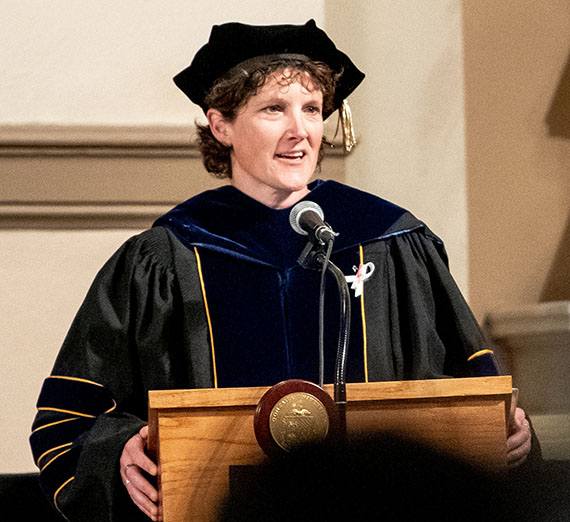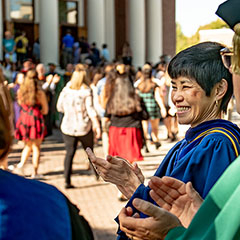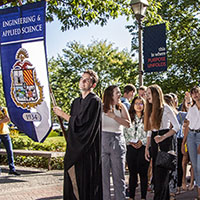Dr. Sue Niezgoda on How to be Academically Successful at GU

Dr. Sue Niezgoda earned her Ph.D. in Civil Engineering from Penn State University in 2004 and is a registered licensed engineer. She joined the faculty at Gonzaga in 2011, and received the Gonzaga Exemplary Faculty Award in 2014. Ask any of her former students, and they will say that Dr. Sue has a strong passion for teaching and truly engages her students by making course material exciting, entertaining, and inspirational. She also conducts research with many of her students in the area of stream restoration, with an emphasis on reintroducing beaver and simulating beaver dams to restore watershed health and ecosystem function. She balances her work life with her love of outdoor activity. In particular, she is an avid triathlete, completing Ironman Coeur d’Alene in 2016.
Hello to you all. I have the distinct honor today to represent the entire faculty in welcoming you to the Gonzaga University academic community. We all very much look forward to getting to know you.

First, I encourage you all to engage your peers. You are all in this together. Learn who your fellow classmates are. Overachieve by making friends with at least two people per class, people who you can contact if you have questions or need notes. Your fellow classmates, those sitting around you right now, are not your competitors, rather they are collaborators, and even friends. Studying together, putting test-cramming groups in place on social media, and even having venting sessions can help establish that feeling of camaraderie that makes everything seem more manageable. By engaging your peers, you can get different perspectives, fill in holes on your notes, learn by teaching others, make good friends, and be a good friend. The friends you make in college can help you succeed academically, but also can last a lifetime.
Second, although this can be very intimidating, I can’t encourage you enough to engage your professors. From your first day on campus, you will have access to some of the greatest scholars. Don’t be intimidated, your Gonzaga Professors are actually human beings to, with real human feelings, shocking, I know! We are here to share our knowledge and we love meeting and interacting with students. So, I encourage you all to establish a real relationship with your professors and make sure we know you. This can be as simple as looking interested in class, professors like nothing better that to see alert and engaged students. You should continue the classroom conversation outside of class, and visit your professors during office hours. Point out something interesting you learned in our class, ask questions about a topic that is confusing to you, or inquire about why we chose to study the field we are teaching in? Professors love to talk …once again, shocking, I know … but we do, especially about our work, so inquire about any research opportunities we might have. If you are shy at first, an e-mail to the professor following up on some issue raised in class or sharing an interesting article (or video) you found related to course material can also break the ice. Make an effort to communicate and it can become comfortable and easy to ask questions, ask for advice or mentorship, or just talk. Overall, relish in the opportunity to engage in one-on-one conversations with a leading scholar who may turn into a lifelong friend and mentor.

Third, engage your major profession/discipline. Find out what your professional societies and student clubs are and join them, as it can allow you to make friends at all levels of the major more easily. The club will also introduce you to your intended profession and can help you as you make decisions regarding academics and your major. The club can also introduce you to an associated local or regional professional society and its professional members. Contact that society or association and let them know you are interested in becoming a member. Attend events and network, network, network. Seek career services through your contacts, you can often find internship and job opportunities from others in the organization. Ask loads of questions and seek out mentoring. By engaging in clubs and professional societies you can learn about what you are getting yourself into, while establishing strong connections that can help you succeed upon graduation.
And finally, engage your passions. Strive to find school-life balance in your college experience. Work hard on your academics, but also budget time to feed your other life passions. Find ways to relieve stress and allow yourself time to do them. Give yourself time for you, and feed your soul. If you manage your time wisely, you can better excel at your academics by allowing time for proper balance.
Craig Lounsbrough, an author and licensed professional counselor quotes “The only reason I can’t jump in and engage life is that I’ve told myself I can’t. Yet, I can’t helping wondering what would happen if I told myself I could?”
I can speak for many faculty here and everyone on this stage when I say that you all CAN engage fully in this experience and we are all very excited to see what will happen when you do. We very much look forward to getting to know you all, and to have deep conversations and meaningful learning experiences that will enhance all our lives over the next four years. So, it is with great pleasure that I welcome you, Class of 2023, and deeply wish you a very insightful and engaging college experience.
